The City of Splendors
Waterdeep, also known as the City of Splendors, or the Crown of the North, is one of the most influential cities in Forgotten Realms, a Dungeons & Dragons (D&D) campaign setting. Located on the Sword Coast, this city is a vibrant commercial and cultural hub, teeming with guilds, nobles, and adventurers.
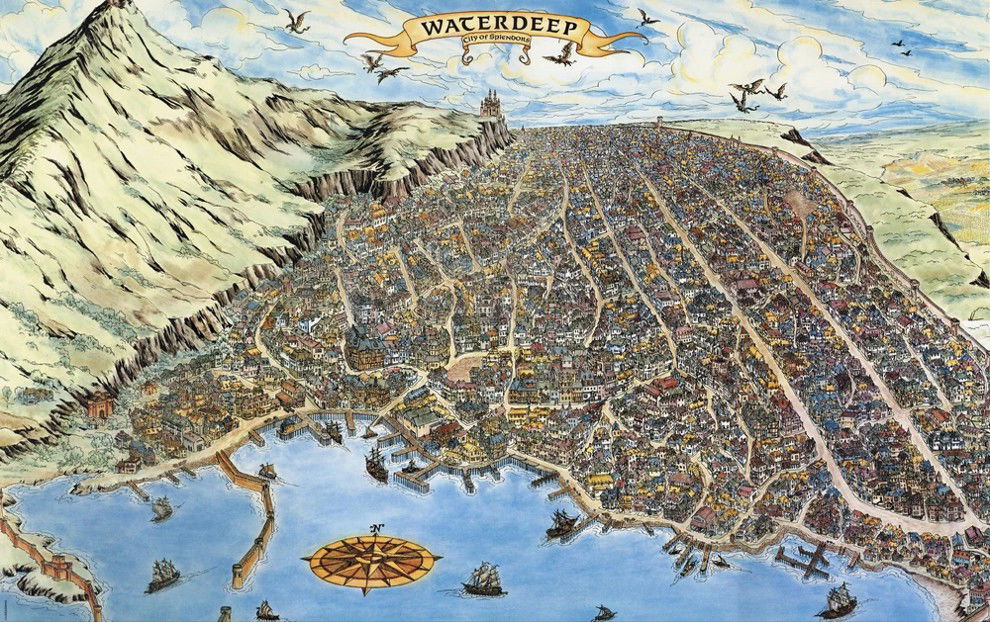
Ruled by the Open Lord and the mysterious Lords of Waterdeep, the city boasts intriguing politics and a rich history, including conflicts such as the Guild Wars.
This is the city where we'll play Lords of Waterdeep.
Lords of Waterdeep - Game Info
Lords of Waterdeep is a 2-to-5 players game, age 12+, by designers Peter Lee and Rodney Thopmson. Art by Eric Belisle, Steven Belledin, Zoltan Boros, Noah Bradley, and Eric Deschamps.
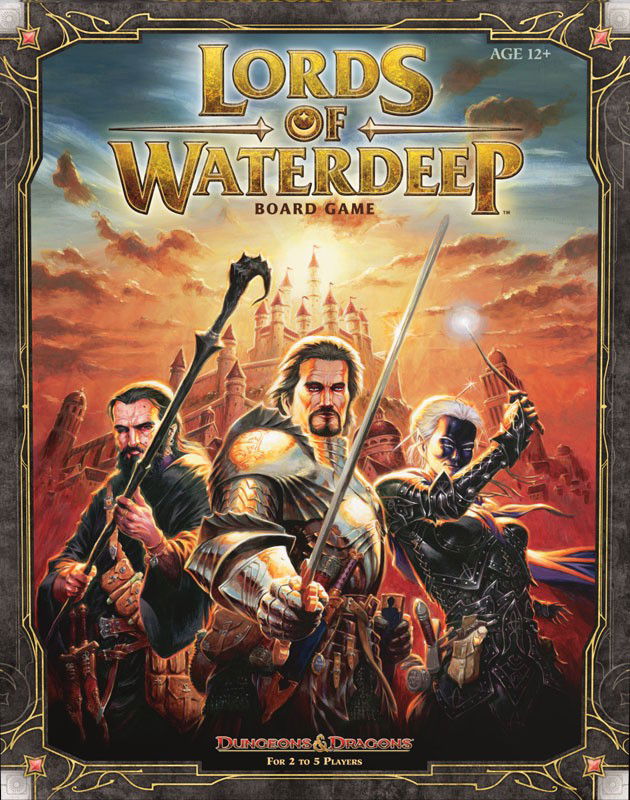
Lords of Waterdeep was released in 2012 by Wizards of the Coast. The main mechanics are: worker placement, set collection, contracts, turn order by action, hidden roles, ownership, take that, and resource management.
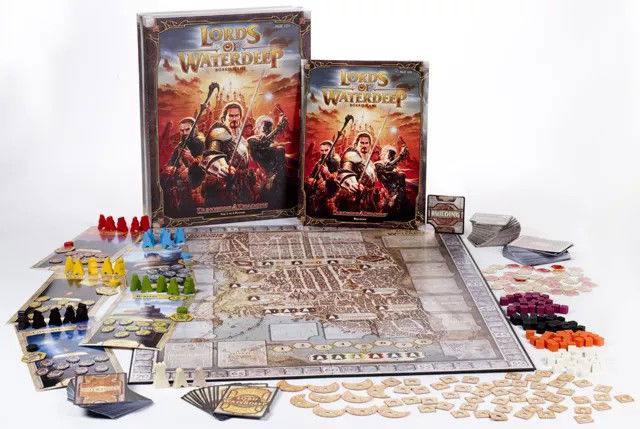
Since its release in 2012, Lords of Waterdeep has gathered nominations and awards, including:
- Ennie, in 2012, for Best RPG-Related Product;
- Also in 2012, it won the Guldbrikken Award;
- In 2013, it won the Origins Awards for Best Board Game.
The Game
We are in Waterdeep, the great metropolis, a place where we seek resources, send agents, and hire adventurers with a single goal: to expand our control over the city. The port offers good opportunities, intrigues are always around, constructions are nonstop, and quests must be completed. Therefore, occupying strategic locations in Waterdeep is essential.
Who will assert their dominance over Waterdeep?
At the start of the game, each player receives:
- an amount of gold coins, which varies depending on who the starting player is;
- a random Lord card, which is kept secret from others. It explains how this Lord will score at the end of the game;
- an amount of agents from a specific organization, which varies depending on the number of players;
- two Mission Cards, which are public and open for completion;
- two Intrigue Cards, which are kept secret from others.
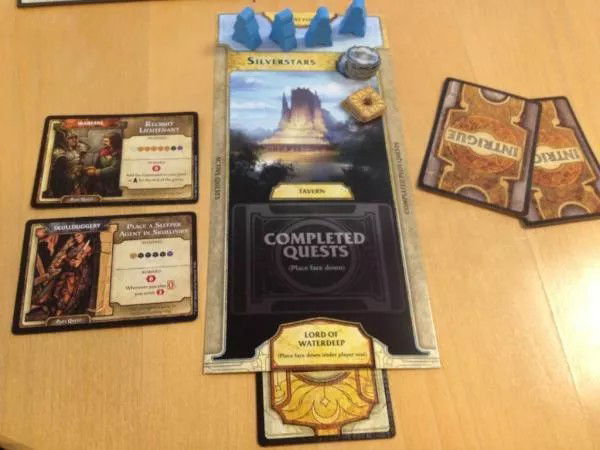
With all that, we and our agents begin the game in the tavern. The Agents belong to one of the five organizations:
- Knights of the Shield;
- City Guard;
- Silverstars;
- Harpers;
- Red Sashes;

Each player, or Lord, sends their Agents to recruit adventurers, which can be anyone from noble heroes to blunt mercenaries, from one of the four classes:
- Cleric;
- Fighter;
- Rogue;
- Wizard;

To control the city, we'll also have to send our agents to various locations to collect gold and fulfill other quests.

Finding these "resources" around the city is the core of Lords of Waterdeep, as it's the worker placement mechanic. Wherever we place one of our agents, that location is occupied and cannot be used by another player until the next round. The main locations include basic and advanced buildings:
- some city shops, where you can earn gold;
- the Builder's Hall, which allows you to build structures and have new, locations (the advanced ones) owned by you;
- the Cliffwatch Inn, a place that always has new quests, gold, and of course, intrigue;
- the Harbor, where the intrigues actually take place;
- several other locations to recruit adventurers; after all, they are your workhorses.
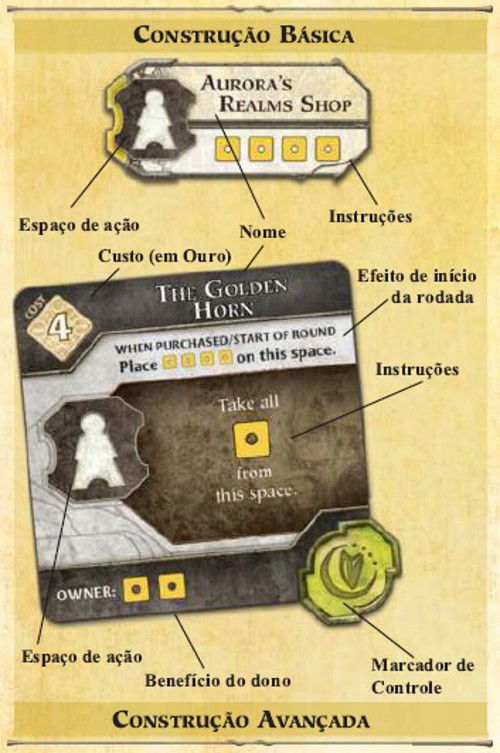
There are five different types of Quests, which are the main way to score points. Each mission requires a different type of adventurer:
- Arcana: requires a Wizard;
- Piety: requires a Cleric;
- Skullduggery: requires a Rogue;
- Warfare: requires a Fighter;
- Commerce: requires any adventurer, and gold;
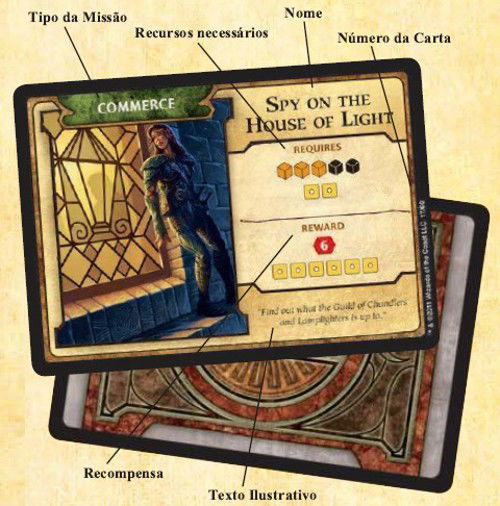
There are also 2 special types of Quests:
Plot Quests: grant a completion reward and an ongoing bonus throughout the rest of the game;
Mandatory Quests: played as Intrigue Cards, forcing an opponent to complete this Quest before any other, thus hindering their development.
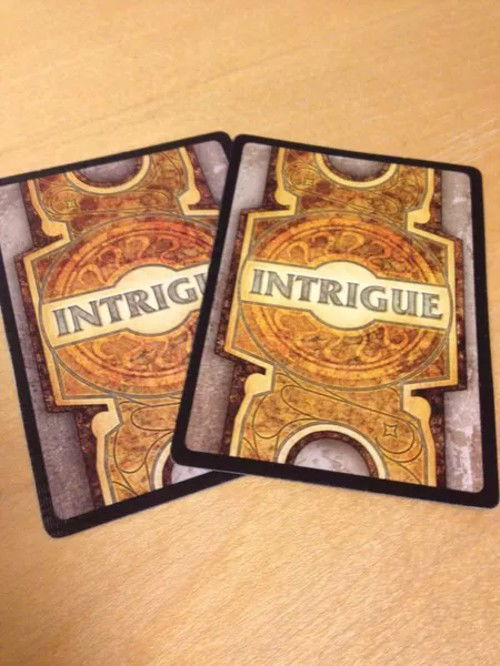
Lords of Waterdeep is played in rounds, and within each round, players take turns of:
- sending an Agent to a location;
- completing a Quest, if desired and able.
Sending an Agent to a location simply involves placing one of your Agents somewhere in the city. If it's a basic building, you execute/earn whatever the location offers. If it's an advanced building, that is, a location built by another player, the player will collect whatever the location offers, but the owner of the location will benefit from using their building. Any resources are collected from the general supply, not from other players.
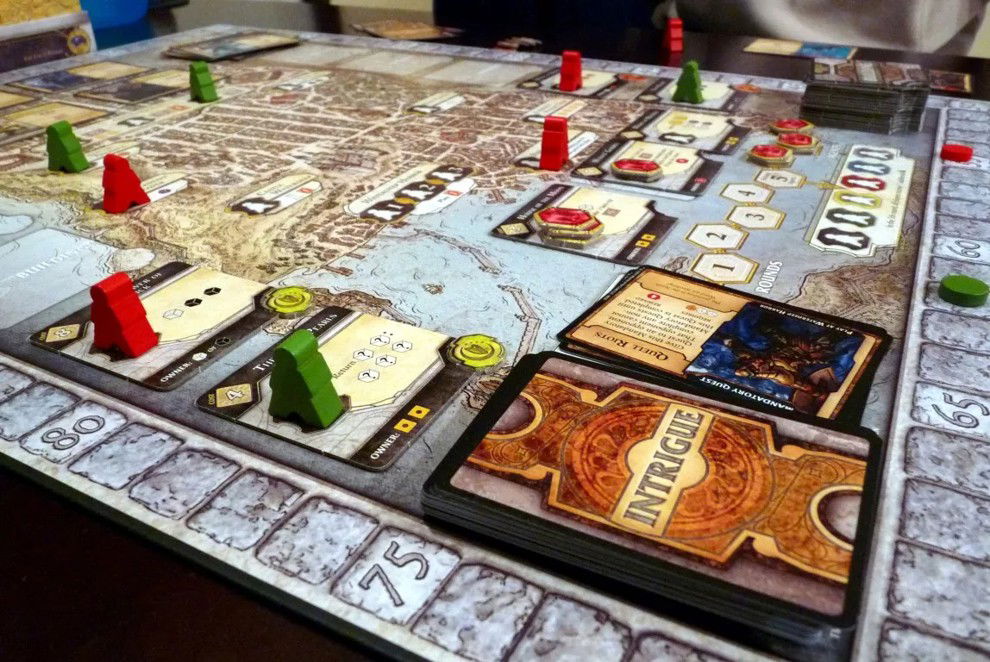
Each turn, after placing an agent, you are allowed to complete a quest —only one per turn, even if you have the requirement to complete other. You'll have to wait for the following turn, when you send another agent. For each completed quest, pay the necessary resources (adventurers and/or gold) and receive the reward(s), which generally consist of victory points and/or gold.

After this, it's the next player's turn, clockwise. If a player has no more agents to send around the city, their turn must be skipped until all other players have no more agents to send on their turns. This is how a round of Lords of Waterdeep ends!
Each player then collects their agents from the city, and a new round begins.
Ending the Game
The game ends after 8 rounds. Then, count all the Victory Points:
- 1 point for each adventurer in your tavern;
- 1 point for every 2 gold in your tavern;
- add the points earned from your Lord card;
- add the points already earned from your completed quests.
The player with the highest score wins the game. In the event of a tie, the player with most gold wins.
Strategy Tips
Lords of Waterdeep is about strategy and logic, sequencing actions in a correct order to get the most out of your agents. Here's a few tips to help you maximize this.
Something I often see in Lords of Waterdeep games is that players often forget about their Lord Card, because it's face down. This makes them lose precious points at the end of the game. Always take a sneaky peek at your Lord card to remember how it scores. In fact, it can guide your actions and strategies!
Intrigue cards can help you a lot. In fact, they slow your opponent's progress more than they help you, so choose carefully when to play the Intrigue card against, as some retaliation is expected. Be prepared.
Prioritize completing Plot Quest. They're great, because they provide benefits throughout the entire game, in addition to the immediate reward for completing them. If you get one of these quests early, your life will be much easier.
Mandatory Quests are an excellent way to disrupt your opponent's strategy. These quests must be completed before they can complete any other quest. Use them strategically.
Since only one quest can be completed per turn, you need to develop a well-thought-out strategy, in a logical order, to gather resources and, as soon as possible, complete a quest before someone can play an intrigue card and derail your plans.
The fifth round is very important, as we'll gain access to an extra agent. Keep this in mind and think ahead where you'll place them, so you can perform more actions and complete more quests on this turn.
Building is very important, because whenever someone uses your building, you'll be rewarded. Look for buildings that can offer benefits to you and other players; this way, they'll always use your building and you'll always benefit.
Going to Waterdeep Harbor to start an intrigue is also important for several reasons:
- it delays your opponents;
- it almost always ruins your opponents' strategy;
- best of all, the agents placed there, once everyone has passed, can be used in other actions - in other words, it's an extra turn; after all, you played an intrigue card and your agent can be used again afterwards. It's amazing!
Lords of Waterdeep is a game where being the first player makes a huge difference. Always strive for it; it's truly worth it, as it grants you priority access to the most sought-after locations in the city.
Based on these tips, develop your best strategy, send your agents to the best locations before your opponents, and win in Lords of Waterdeep!
Unboxing, Rules, and Gameplay Videos
Unboxing:
Rules:
Gameplay:
Pedagogical Tips
If you're looking for a simple, yet highly strategic game, that also provides a ton of important stimulation for kids, Lords of Waterdeep is the game for you.
The game will require a lot of attention, focus, and logical thinking from children, as completing the quests requires planning. So, they either focus or they won't be able to accomplish much. However, Lords of Waterdeep is so iconic that kids will instantly grasp the gameplay and start having fun.
Management will also be a key factor, as they'll have to control the adventurers they're seeking to complete their quests, as well as gold. These are simple calculations that will help kids brush up on their math skills.
Deciding where to send agents will make the kids constantly consider their decisions, as well as the right time to go to a certain location in the city. They'll learn through playing.
Educationally, Lords of Waterdeep encourages strategy, management, decision-making, logical mathematical reasoning, and, on top of that, it's fun!
I recommend Lords of Waterdeep for your collection!!!












— Comments 0
, Reactions 1
Be the first to comment